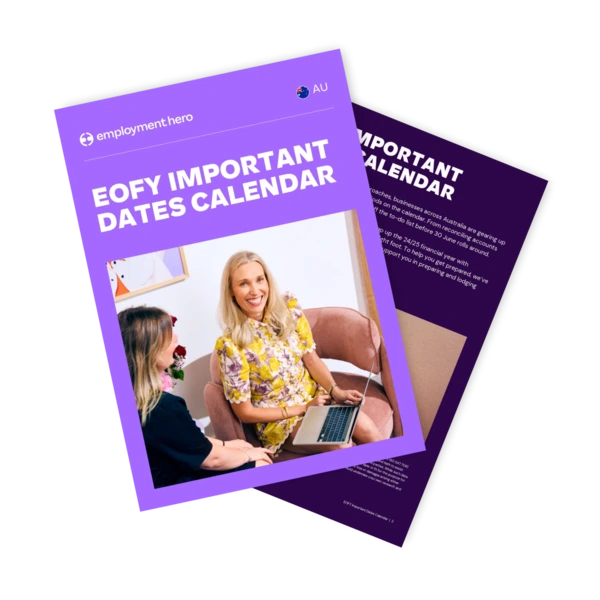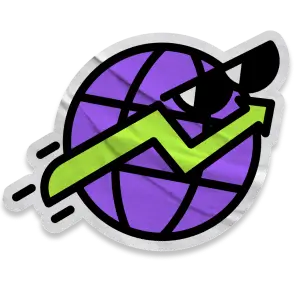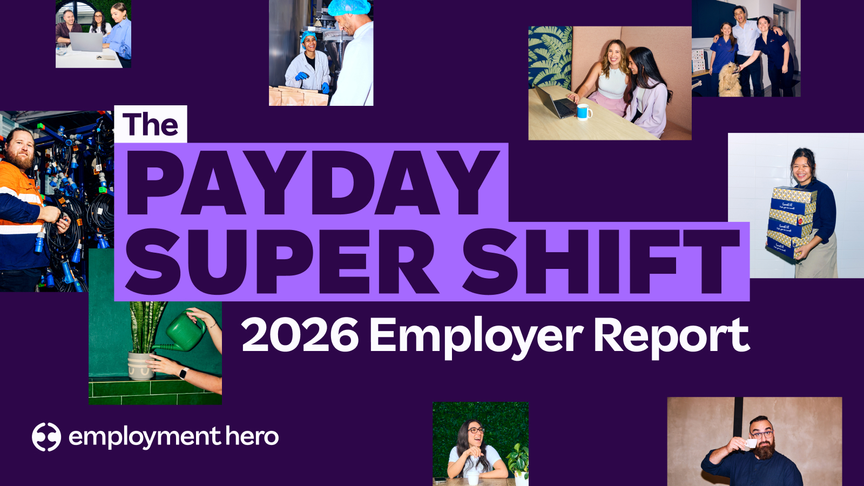EOFY Important Dates Calendar

As the end of the financial year approaches, businesses across Australia are gearing up for one of the most admin-heavy periods of the year. From reconciling accounts to lodging reports with the Australian Taxation Office (ATO), there’s a long list of compliance deadlines to meet before 30 June.
Without a clear plan, tax time can become stressful and costly. That’s why we’ve created a downloadable EOFY Important Dates Calendar to help you take control, feel confident in your compliance, and avoid last-minute headaches.
Download your copy today.
Disclaimer: The information in this calendar is current as at Thursday 9 May 2025, and has been prepared by Employment Hero Pty Ltd (ABN 11 160 047 709) and its related bodies corporate (Employment Hero). The views expressed in this calendar are general information only, are provided in good faith to assist employers and their employees, and should not be relied on as professional advice. The Information is based on data supplied by third parties. While such data is believed to be accurate, it has not been independently verified and no warranties are given that it is complete, accurate, up to date or fit for the purpose for which it is required. Employment Hero does not accept responsibility for any inaccuracy in such data and is not liable for any loss or damages arising either directly or indirectly as a result of reliance on, use of or inability to use any information provided in this calendar. You should undertake your own research and seek professional advice before making any decisions or relying on the information in this calendar.

How to get your financial records ready for the Australian Taxation Office
When it comes to EOFY preparation, your first step is ensuring your financial records are in order. This includes everything from employee payslips and super contributions to expense receipts and income statements.
Our EOFY checklist outlines every document and task you need to cover before the deadline.
When does the Australian financial year start and end?
The Australian financial year runs from 1 July to 30 June each year. Most business tax obligations, including goods and services tax (GST) and company income tax returns, align with this period.
To claim deductions and avoid penalties, you must ensure that all income and expenses are recorded accurately within this timeframe.
What financial records do I need to keep for tax time?
Keeping the right records is essential for EOFY. At a minimum, your business should retain:
- Income and sales records
- Expense receipts and invoices
- Payroll and superannuation data
- BAS (Business Activity Statement) lodgement summaries
- Copies of lodged tax returns
These documents must be stored for at least five years, as required by the ATO.
What’s the difference between a tax return and a company income tax return?
A tax return refers broadly to the income declarations made by individuals, sole traders and other entities. A company income tax return is specific to incorporated businesses and includes different schedules, such as dividends, franking credits and losses.
Your obligations will vary depending on your business structure – which is why it’s important to prepare the correct documentation and lodge by the right deadlines.
Do I need a registered tax agent to lodge my tax return?
You’re not required to use a registered tax agent, but many small and medium businesses do. Tax agents can:
- Ensure you meet key deadlines
- Help you understand what business expenses are deductible
- Lodge returns on your behalf
- Minimise errors that could trigger an audit
Engaging a professional can reduce risk and give you peace of mind – especially during the busy EOFY season.
How does my business structure affect my tax obligations?
Your tax requirements depend heavily on your business structure:
- Sole traders must lodge personal and business income together.
- Partnerships and trusts must report income distributions correctly.
- Companies must lodge separate company income tax returns.
- Super funds have distinct lodgement rules and deadlines.
Your calendar should reflect the right dates for your structure – which is exactly what our downloadable calendar covers.
What business expenses can I claim at the end of the financial year?
The ATO allows businesses to claim deductions for eligible business expenses that relate directly to earning income. These may include:
- Staff wages and superannuation
- Rent and utility bills
- Equipment and software
- Business travel and training
Professional services, such as accounting or legal advice
To maximise your deductions, keep clear records and ensure payments are made before 30 June.
Download your EOFY Important Dates Calendar
Our free EOFY Important Dates Calendar has everything you need to stay on track with key reporting and lodgement dates from May to July 2025. It’s designed to:
- Support small businesses, accountants and payroll professionals
- Help you plan BAS submissions, FBT lodgements and super contributions
- Reduce the risk of penalties or late fees
Download the calendar now and keep it close as you work through EOFY.

Register for the downloadables
Related Resources
-
 Read more: The Payday Super Shift: 2026 Employer Readiness Report
Read more: The Payday Super Shift: 2026 Employer Readiness ReportThe Payday Super Shift: 2026 Employer Readiness Report
New research on the cash flow risk and compliance gaps facing Australian employers. Download the report now and access industry…
-
![Restaurant Industry Award Summary [MA000119]](https://employmenthero.com/wp-content/uploads/2026/02/Award-Summary_Restaurant-Industry.webp) Read more: Restaurant Industry Award Summary [MA000119]
Read more: Restaurant Industry Award Summary [MA000119]Restaurant Industry Award Summary [MA000119]
This Award primarily applies to businesses operating restaurants, cafés and similar establishments, but also extends to employees performing similar roles.
-
![Manufacturing and Associated Industries and Occupations
Award Summary [MA000010]](https://employmenthero.com/wp-content/uploads/2026/01/Award-Summary_Manufacturing-Industry.webp) Read more: Manufacturing and Associated Industries and Occupations Award Summary [MA000010]
Read more: Manufacturing and Associated Industries and Occupations Award Summary [MA000010]Manufacturing and Associated Industries and Occupations Award Summary [MA000010]
The Manufacturing Industry Award covers employers and employees who work in manufacturing or associated industries.























